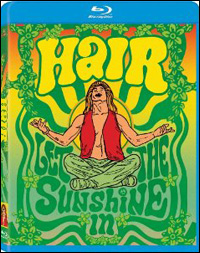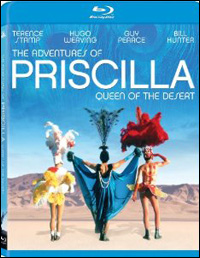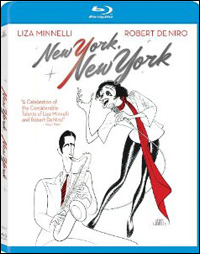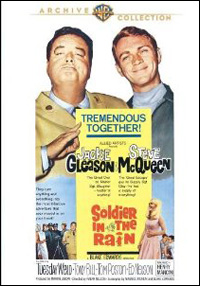
*
This month brings us four DVDs with strong theatre connections. Topping the group is the 1965 screen adaptation of Herb Gardner's 1962 comedy hit A Thousand Clowns [M-G-M]. Why is this film only now, finally, coming to DVD? And in M-G-M's "Limited Edition Collection," which is to say as a spare, bonus-free, movie-on-demand release? No matter; Gardner's cockeyed comedy of nonconformism is a wonderful movie with a wonderful cast filmed in an unconventional and intriguing manner. "A Thousand Clowns" preserves four of the six members of the Broadway cast, which perhaps adds inestimable value to the piece. Certainly, the two Broadway revivals — starring Judd Hirsch in 1996 and Tom Selleck in 2001 — both misfired on most cylinders. From the viewpoint of this theatregoer, though, it wasn't in either case the play that was the problem.
Start with Jason Robards, still in his late thirties when the play was originally produced (following his appearances in Long Day's Journey Into Night and Toys in the Attic). This is Robards at his comic best; his Murray Burns wanders the deserted streets of Manhattan shouting wakeup calls to the civilians, offering a sidelong glance at the normal people, and we simply believe him.
Robards' stage leading lady is absent; Sandy Dennis had moved on from her Tony-winning performance in A Thousand Clowns to her Tony-winning performance in the 1964 hit Any Wednesday, and was en route to her Oscar-winning performance in Mike Nichols' 1966 movie version of Who's Afraid of Virginia Woolf? But Dennis' absence is our gain, as producer-director Fred Coe instead gives us the film debut of Barbara Harris. Here she is just before going into rehearsals for On a Clear Day You Can See Forever. Talk about fresh talent.
And here's another very fresh talent: William Daniels as Albert, the fiancé she dumps; he also went directly into Clear Day as Warren, the fiancé she dumps. And shortly thereafter on to the role of John Adams in 1776. Daniels was little known at the time of A Thousand Clowns, although he had made an auspicious Off-Broadway presence in 1960 in Edward Albee's The Zoo Story. Here, he is the perfect foil to Robards and Harris. Daniels is joined by two other holdovers from Broadway, character comedians Gene Saks and Barry Gordon. That's right, Gene Saks, as the miserable kid's show host Leo Herman (AKA Chuckles the Clown). As A Thousand Clowns continued its stage run, Saks got the opportunity to direct a play — Carl Reiner's Enter Laughing — and never looked back. But he did return to his Chuckles garb for the Thousand Clowns film, between Broadway directing gigs on the musicals Half a Sixpence and Mame.
Not the least of these clowns in "A Thousand Clowns" is Barry Gordon, who was a mere 13 at the time of his one and only Broadway appearance. For which he, like Ms. Dennis, received a featured Tony nomination. (Gordon lost, though — to Alan Arkin for Enter Laughing.) Gordon went on to a long career in television, with a seven-year stint as president of the Screen Actors Guild. He took over the office from Patty Duke — who came to prominence as a child actor in Fred Coe's prior production, "The Miracle Worker" — and was a few years later succeeded by William Daniels. But that was the adult Gordon; in the "Thousand Clowns" film, the actor (who was by then already 16) is remarkably funny as a child with far more emotional maturity than his uncle. Or any of the other Gardner characters, for that matter. And let's not forget Gordon's interplay with Bubbles, the toy doll with electric lights in her — well, if you've seen the film you'll know what I'm talking about.
The role of Murray's brother Arnold is played by Martin Balsam, a veteran stage actor who was not in the stage production. While the "Thousand Clowns" film received four Oscar nominations — including Best Picture, which it lost to "The Sound of Music" — Balsam was the only winner, thanks to the scene in which his character finally explodes in frustration. Also on hand, in a brief scene added by Gardner for the film, is a character with a long comic monologue listed merely as "The Man in the Office." If this man in the office looks familiar, that's because it's the film debut of John McMartin.
This was the first of only two films directed by Coe, who was more usually a producer (although with a considerable amount of television directing experience). Unusual but fascinating, with the visuals providing an offbeat but keen view of Manhattan just before things started to change in the mid-60s. They seem to have done extensive location shooting in what was to become the Lincoln Center era, centering on a half-demolished street of brownstones. One scene actually shows the Metropolitan Opera House as a construction shell, before the front walls went up. Added to this is a joyous score, full of marching music, written by none other than Don Walker and conducted by Hal Hastings. Walker actually received an Oscar nomination for his efforts.
Between Herb Gardner's script, Coe's direction, and the unforgettable performances by all six principals (Robards, Harris, Daniels, Saks, Gordon and Balsam), "A Thousand Clowns" is like a trip to an old-fashioned candy store, with egg creams.
| |
 |
|
The motion picture Hair [M-G-M], on the other hand, was altogether different. The screenplay came from Michael Weller, author of Moonchildren, which centered on eight college students coping with the tumultuous social issues of the late '60s. Moonchildren was shatteringly good when it reached the Royale in early 1972, but it met a stone wall of generational apathy and closed after a mere two weeks. The play was almost immediately revived Off-Broadway in 1973, meeting great success both in New York and around the country.
This made Weller a logical choice for the Hair screenplay, although I suppose R & R expected to write it themselves. (They didn't seem especially happy with the results; but then, it wasn't in their nature to be happy with anyone altering their work.) Weller took many of the songs and some of the characters — or their names, anyway — and created a new story. His Hair told of a boy from Oklahoma, one Claude Hooper Bukowski (John Savage), who travels to Central Park where he meets some hippies led by Berger (Treat Williams). In the musical, Claude comes from Flushing, Queens. And so on.
The film, now available on Blu-ray, had a mixed reception; over the decades, though, it seems to have found a wider degree of popularity. It is "Hair," yes; but to me, it has never quite seemed to be Hair. To today's audience, though, it might as well be a nostalgic period piece.
*
| |
 |
|
*
| |
 |
|
*
| |
 |
|
Also from Warner's made-to-order department comes Jean Renoir's Woman on the Beach. Renoir — whose masterpieces include "Grand Illusion" and "Rules of the Game," and who is the only 20th century film director whose portraits, painted by dear old dad, can be found on the walls of the world's great museums — spent most of the 40s in Hollywood, with less-than-spectacular results. "Woman on the Beach" (1947), his fourth and final American film, is fascinating but muddled; the studio (RKO) took this moody psychodrama and reshot it, diminishing what Renoir had in mind. But it is certainly arresting. Joan Bennett, Robert Ryan and Charles Bickford make up the triangle.
(Steven Suskin is author of the recently released Updated and Expanded Fourth Edition of "Show Tunes" as well as "The Sound of Broadway Music: A Book of Orchestrators and Orchestrations," "Second Act Trouble" and the "Opening Night on Broadway" books. He also pens Playbill.com's Book Shelf and On the Record columns. He can be reached at [email protected].)
*
Visit PlaybillStore.com to check out theatre-related DVDs for sale.









